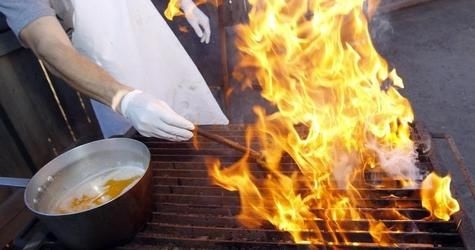Expatriates apprehended barbecuing in non-allocated places in Kuwait will be deported, the head of the municipal council has said.
“There is a plan to set up a new link with the interior ministry to deport the foreigners who break the municipal laws, including barbecuing on the beaches and public parks,” Ahmad Al Saubaih said. “The municipality had designated specific spots at the beach and in public gardens where people could barbecue. It has also imposed a ban on having a barbecue in certain areas. However, several people fail to comply with the laws and regulations, even though they are aware that those who cause any form of damage to public utilities and facilities are punished,” he said, quoted by local daily Al Rai on Sunday.
Faced with the growing phenomenon of Kuwaitis and expatriates barbecuing nonchalantly and without any regard for cleanliness at the beach and in public parks and gardens, the municipal council in 2012 sought to curb it by introducing fines of up to KD 300.
|
Dec 28 2014 |
more articles from  |
Kuwait to deport expats over illegal barbecuing
 Photo Credit:Reuters/Mike Stone
Photo Credit:Reuters/Mike StoneSunday, Dec 28, 2014
Manama: Expatriates apprehended barbecuing in non-allocated places in Kuwait will be deported, the head of the municipal council has said.
“There is a plan to set up a new link with the interior ministry to deport the foreigners who break the municipal laws, including barbecuing on the beaches and public parks,” Ahmad Al Saubaih said. “The municipality had designated specific spots at the beach and in public gardens where people could barbecue. It has also imposed a ban on having a barbecue in certain areas. However, several people fail to comply with the laws and regulations, even though they are aware that those who cause any form of damage to public utilities and facilities are punished,” he said, quoted by local daily Al Rai on Sunday.
Faced with the growing phenomenon of Kuwaitis and expatriates barbecuing nonchalantly and without any regard for cleanliness at the beach and in public parks and gardens, the municipal council in 2012 sought to curb it by introducing fines of up to KD 300.
However, officials said that the deterrence measure did not seem to have achieved the results the municipal council sought.
According to Riyadh Al Rabie, the head of the emergency team, more than 400 people were booked last year for failing to abide by the barbecue law.  “Around KD30,000 are spent annually to restore and fix facilities damaged by people who do not respect the laws and regulations,” he said. “There is a need to toughen the penalties in order to deter people from breaking the laws,” he said.
“Around KD30,000 are spent annually to restore and fix facilities damaged by people who do not respect the laws and regulations,” he said. “There is a need to toughen the penalties in order to deter people from breaking the laws,” he said.
Municipal council authorities have often said that the beautification of public facilities and maintaining them for recreation, entertainment and relaxation costs the state millions of dinars, and must be protected from harmful acts and damaging conducts.



